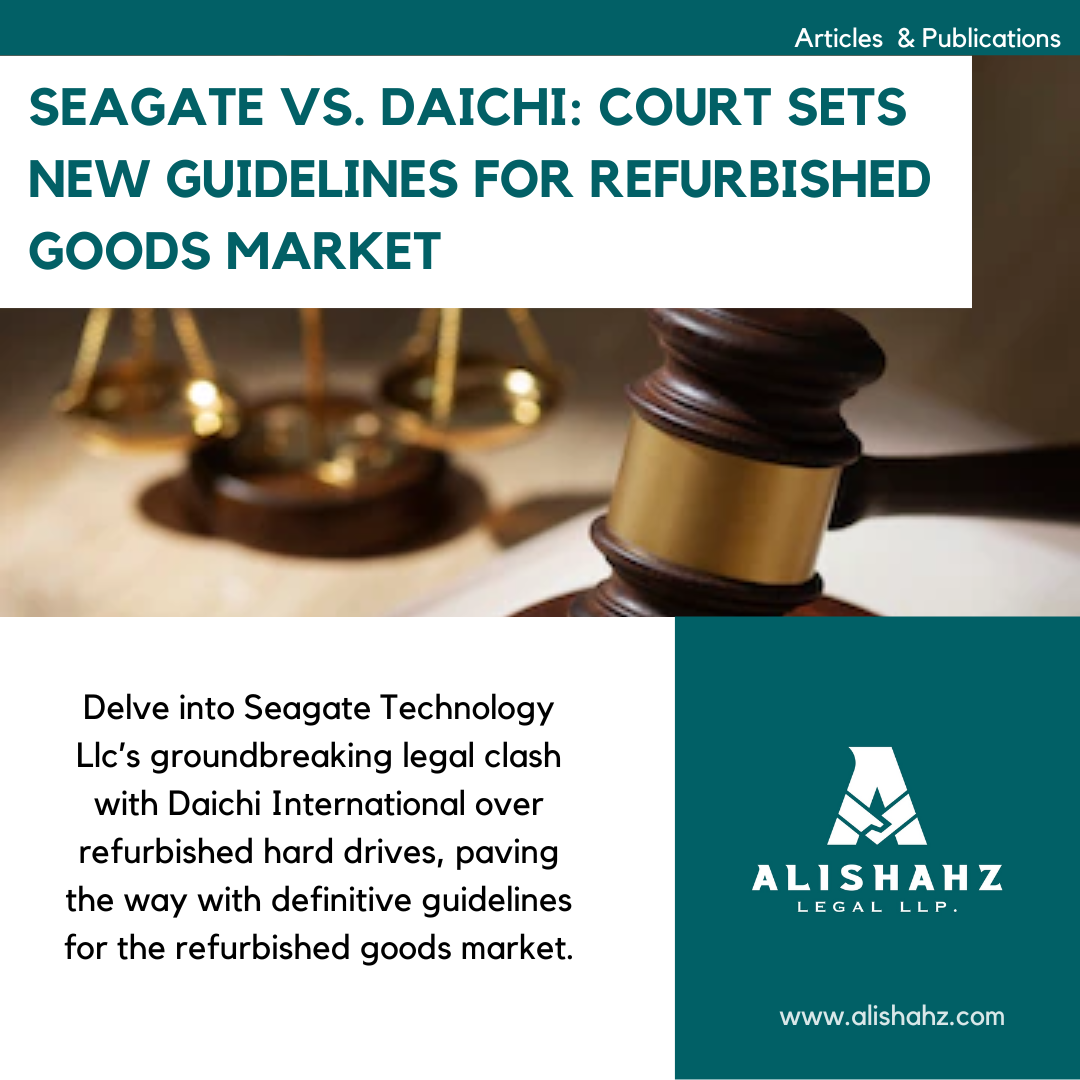Adv. Lazim Vengattil, Associate, Alishahz Legal LLP
In a high-stakes legal battle by Seagate Technology LLC (“Seagate”) and Western Digital Technologies Inc. (“WD”). have taken on Daichi International and its associates over a contentious issue of trademark infringement in the context of refurbished goods. The case, Seagate Technology LLC vs. Daichi International and other connected matters (CS(COMM) 67/2024), revolved around the unauthorized refurbishment and rebranding of Seagate’s hard disk drives (HDDs) by several Indian entities, setting important legal precedents on the matter.
THE PLAYERS AND THEIR MOVES
Seagate and WD, two giants in the HDD manufacturing industry, have accused Daichi International, Consistent Infosystems Pvt. Ltd., Geonix International Pvt. Ltd., and Cubicor Information Systems Pvt. Ltd. of trademark infringement. The plaintiffs allege that these companies are importing end-of-life HDDs, stripping them of their original branding, repackaging them under new names, and selling them with extended warranties.
Seagate and WD’s core argument hinges on the interpretation of Sections 30(3) and 30(4) of the Trade Marks Act, 1999. According to these provisions, altering the condition of goods that bear a registered trademark, such as removing the ‘Seagate’ or ‘WD’ logos, constitutes impairment and thus infringement. The plaintiffs argue that the defendants’ actions not only mislead consumers but also potentially harm the reputation and goodwill associated with their brands.
The defendants do not deny removing the original trademarks. Instead, they argue that this removal is a deliberate attempt to avoid any association with Seagate or WD, thereby ensuring that any responsibility or liability for the refurbished products rests solely with them. They further contend that their branding and extended warranties clearly indicate to consumers that the products are refurbished and not directly affiliated with the original manufacturers.
GOVERNMENT STANCE: RIGHT TO REPAIR
Adding a layer of complexity to the case is the Indian government’s stance on the refurbishment market. Far from being restrictive, the government has been actively promoting the “Right to Repair” initiative, which aims to make repairs and refurbishments accessible to consumers across different economic strata. This policy underscores the legitimacy and importance of the refurbishment market, further complicating the plaintiffs’ position. In the judgment, it is noted that accepting the plaintiffs’ contentions prima facie would amount to killing the refurbishment market, which policymakers haven’t countenanced.
THE COURT’S GUIDELINES
Delhi High Court has allowed the defendants to continue selling refurbished HDDs, but with conditions to ensure transparency and consumer protection:
1. Clear Manufacturer Identification: Packaging must clearly state that the HDD was originally manufactured by Seagate or WD, without misleading consumers.
2. Use of Word Marks Only: References to the original manufacturers must use their word marks (e.g., “Seagate” or “WD”) rather than logos.
3. Warranty Disclaimer: Packaging must explicitly state that there is no manufacturer’s warranty or service provided by Seagate or WD.
4. Refurbishment Notice: Prominent labeling must indicate that the product is “Used and Refurbished” by the defendants.
5. Refurbisher’s Warranty: Any warranty offered must be clearly stated as being provided by the refurbisher, not the original manufacturer.
6. Accurate Feature Description: Descriptions of the product’s features and purposes must be accurate and truthful, avoiding any misleading information.
7. These conditions must also be applied to all promotional materials, websites, e-commerce listings, brochures, and manuals.
CONCLUSION
This landmark judgment sets a crucial precedent for handling trademark infringement in the refurbished goods market. The Court along with the detailed guidelines, provides a robust framework to protect the rights of original manufacturers while allowing refurbishers to operate within legal boundaries. The outcome of Seagate vs. Daichi serves as a crucial reference point for future cases in the refurbishment sector, marking a significant step in the evolution of trademark law in India. As the “Right to Repair” movement gains momentum, businesses involved in refurbishment must navigate these legal landscapes with heightened awareness and diligence.

